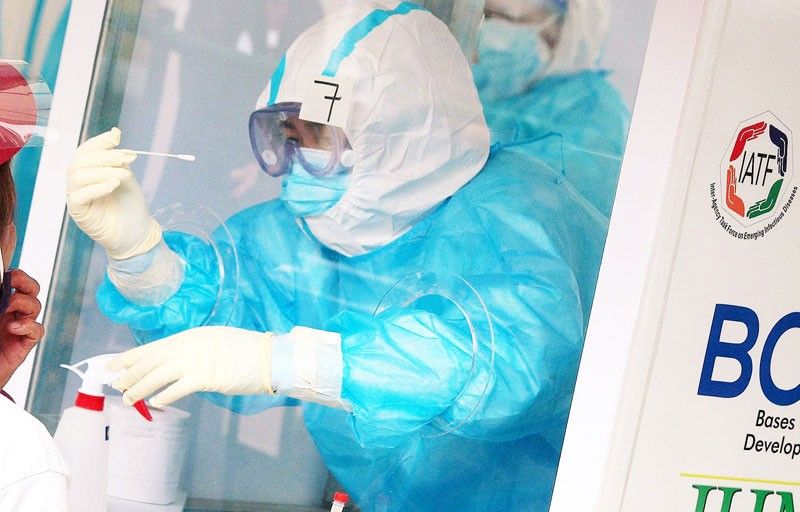Duterte set to OK price cap on COVID-19 tests

MANILA, Philippines — President Duterte is ready to sign an executive order that will set a ceiling on the cost of swab tests and other laboratory examinations for the coronavirus disease 2019, his spokesman said yesterday.
“We are waiting for the decision of the President and all the staff work. So it’s a matter of time... I think any time, the President will sign his executive order,” presidential spokesman Harry Roque Jr. said.
His statement confirmed earlier reports that the memo was pending in the Office of the Executive Secretary.
Roque reiterated that there are many government institutions and private health offices that offer affordable COVID-19 testing services.
“In Metro Manila, there are places one could avail of a cheap PCR (polymerase chain reaction) test, like the Philippine Children’s Medical Center, the National Kidney and Transplant Institute, Philippine Lung Center, Perpetual Help Medical Center,” he said in Filipino.
Roque added that there are between 1,500 and 2,000 laboratories accredited to conduct PCR tests nationwide.
Earlier, Health Undersecretary Maria Rosario Vergeire noted the varying prices of swab tests for COVID-19 throughout the country.
This prompted the Department of Health (DOH) to recommend to the President the issuance of an executive order setting a price ceiling to regulate how much is charged for the test.
Meanwhile, the DOH clarified that results of the COVID-19 tests are not being released in the government’s freedom of information (FOI) portal.
“This is to inform the public that test results may not be requested from and released through the FOI portal as this constitutes a violation of the Data Privacy Act,” read the DOH advisory.
It said the release of swab results is prohibited because it contains personal information of the patients that are not for public consumption.
Vietnam’s donation
Vietnam donated $50,000 (about P2.42 million) worth of COVID-19 reverse transcription PCR test kits with accompanying extraction kits to the Philippines.
Foreign Affairs Secretary Teodoro Locsin Jr. and Health Undersecretary Carolina Taino received the donation from Vietnamese Ambassador Hoang Huy Chung at the Department of Foreign Affairs (DFA) office last Wednesday.
The test kits have since been delivered to the Research Institute for Tropical Medicine (RITM).
Describing the donation as a manifestation of the enduring close friendship between the Philippines and Vietnam, Chung assured Locsin of the Vietnamese government’s support for the Philippines’ ongoing efforts in fighting COVID-19, as well as in promoting and protecting the welfare of the Filipino people.
The donation, which comes ahead of the 5th anniversary of the establishment of the Philippines-Vietnam Strategic Partnership on Nov. 17, 2020, was shipped with support from Vietnamese entrepreneur Johnathan Hanh Nguyen and the Philippine embassy in Hanoi.
Vietnam is making similar donations to other ASEAN member states.
For cheaper vaccine
At the Senate yesterday, Sen. Risa Hontiveros urged Malacañang to support an international campaign to ease intellectual property (IP) agreements to ensure universal access to affordable and effective COVID-19 vaccine.
Hontiveros filed Senate Resolution No. 560, urging the government through the DFA to support the proposal of India and South Africa for the World Trade Organization (WTO) to suspend the implementation, application and enforcement of relevant provisions under the Trade-Related Aspects of Intellectual Property Rights (TRIPS) for the COVID-19 vaccine.
TRIPS seeks to protect intellectual property, but has in the past made new medicine and medical technology extremely expensive especially for developing countries.
“In a global pandemic of unprecedented proportion, it is inhumane and unjust to let stringent IP regulations stand in the way of a vaccine that can save lives. We must stand in solidarity with other developing countries in this call so everyone, and not people in just the rich and powerful countries, will have access to COVID-19 vaccines once they become available,” she said.
The senator added that developing countries are in dire need of funds for social services and essential expenditures for employment, health and education, “but will also need to realign their national budget to procure a vaccine.”
“The COVID-19 vaccine should not be treated as a product to be sold to the highest bidder. Billions of lives are at stake here,” added Hontiveros, who also authored the Cheaper Medicines Act of 2008 (RA 9502).
Online consultations
In a virtual briefing yesterday, DOH Assistant Secretary Eric Tayag said the government has already set up a national health data repository in line with the digital transformation of the country’s health system.
Tayag said the creation of a national health data repository is provided under the Universal Health Care (UHC) Law.
The digital transformation, Tayag said, will make health services cheaper and more accessible even in far-flung areas. It would be beneficial to both doctors and patients.
But he said digital transformation would require large investment and will take time to be fully implemented.
Health experts reported that Filipinos can still enjoy medical services and stay healthy through digital health technology without stepping into the hospital.
China’s first internet-based hospital WeDoctor International Group chief operating officer (CEO) Matthew Wang said the COVID pandemic pushed to the forefront digital health technology.
“With COVID 19, one silver lining is that people realize what technology can do and it can also take care of the health system,” Wang said in a virtual conference initiated by Milken Institute.
Milken gathered local and regional stakeholders in a zoom meeting to discuss the latest health innovations, including telehealth that could make healthcare services faster and cheaper.
A digital health system, Wang said allows doctors to closely monitor an individual while at home and without the need of going to the hospital, by using a gadget or device.
“A digital health system means staying healthy and using device out of the hospital, basically staying at home and (doctors) can monitor you 24-7 and give you advice on healthy living so that we prevent you from getting into real hospital. This I think is the future,” Wang said.
Wang said the technology is already available and only policies and regulations are needed to keep abreast with digital health technology.
Former health secretary Manuel Dayrit said the government and legislators must push for the adoption of the required infrastructure to make digital health technology a reality in the country.
Doctor Joseph Mocanu, Verge HealthTech Fund managing partner, said there are tremendous opportunities in the Philippines for a digital healthcare system that could make the lives of 100 million Filipinos better and healthy. – Mayen Jaymalin, Pia Lee-Brago and Cecille Suerte Felipe
- Latest
- Trending






























